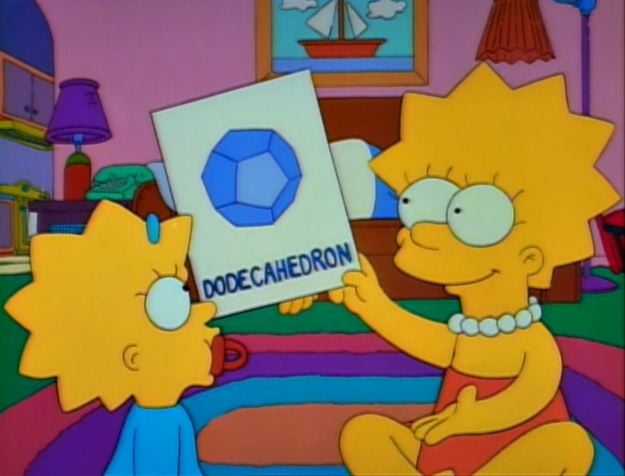simpsonsmath.com
Recent Portrayals of Mathematically Talented Women in Hollywood
Popular culture can reveal, reflect, and even shape how society views mathematics. Popular culture can be a powerful way to engage the public but care must be taken because stereotypical representations of mathematicians can actually be discouraging to students (see Impact on Students below).
Angel,
Buffy the Vampire Slayer, and Serenity
Strong women characters have mathematical talent in Joss
Whedon's television shows and movie.
See
Mathematically Talented Women in Hollywood:
Fred in Angel, PRIMUS, XVII(1), March 2007, pp. 103-116.
Futurama
Amy Wong is an engineering student at Mars University, who is currently
doing her internship at the Planet Express Interstellar Delivery Company, New
New York, but she rarely contributes to the scientific discussions.
She is very social and fashion conscious.
See Klein's Beer: Futurama
Comedy and Writers in the Classroom, PRIMUS, XVII(1), March 2007, pp.
52-66.
Ice Princess The main character
is a physics "geek" who discovers that she can apply science to figure skating.
Unfortunately, the movie does a poor job of representing a balance in
career options and a social life. For example, she must choose between
physics at Harvard and skating. There is no mention of Paul Wylie,
the 1992 Olympic silver medalist in skating,
who managed to skate and graduate cum laude from Harvard,
nor any mention of postponing Harvard for a year.
Mean Girls The main
character struggles to balance her mathematical talent with
social pressures and her attempts at being popular, and she pretends to be
bad at math in order to impress a boy.
NUMB3RS A graduate student
woman received her PhD with the main character as her thesis advisor,
and they are pursuing a romantic relationship,
even though she has decided to remain at the school as a student
to receive a second PhD in a related field.
They have not discussed the fact that this could affect her future
career and would violate faculty
guidelines at some institutions. For example, what happens when she needs a
letter of
recommendation (in the
case they have a bad breakup, in the case they stay together, etc.)?
Gary Lorden said,
"I think it would be great if they made [Charlie and Amita's relationship]
more of a collaboration and less of a beautiful assistant sort of thing." Also see Complex NUMB3RS,
FOCUS, the Newsletter of the Mathematical Association of America, May, 2006.
Proof The main character
is a woman struggling with the possibility of becoming a mathematician.
When she shows work to a friend, people question whether she was
really the author.
In addition, this movie offers a fairly stereotypical
representation of mathematicians as those who must battle with
obsession and insanity in order to do great mathematics.
The Simpsons While Lisa Simpson is
definitely not portrayed as the most popular girl in school, she is a
mathematically talented character that my students find very likable.
The episode
Girls
Just Want to Have Sums
(original airdate April 30, 2006)
explored the topic of women in mathematics.
Also see
related quotes
Science
Soap Opera Fails (Lara Croft, Ally McBeal or Missus Beaton? A lesson in social engineering
by Mark Ballard)
Impact on Students
All consuming images: How demeaning
commercials that elicit stereotype threat can restrain women
academically and professionally.
Davies, P. G., Spencer, S. J., Quinn, D.
M., & Gerhardstein, R. (2002).
Personality and Social Psychology
Bulletin, 28, 1615-1628.
Abstract: Women in quantitative fields risk being personally
reduced to negative stereotypes that allege a sex-based math inability.
This situational predicament, termed stereotype threat, can under-
mine women's performance and aspirations in all quantitative
domains. Gender-stereotypic television commercials were
employed in three studies to elicit the female stereotype among
both men and women. Study 1 revealed that only women for
whom the activated stereotype was self-relevant underperformed
on a subsequent math test. Exposure to the stereotypic
commercials led women taking an aptitude test in Study 2 to avoid math
items in favor of verbal items. In Study 3, women who viewed the
stereotypic commercials indicated less interest in educational/
vocational options in which they were susceptible to stereotype
threat (i.e., quantitative domains) and more interest in fields in
which they were immune to stereotype threat (i.e., verbal
domains).
Mathematics : a dilemma for feminists.
Lynch, Julianne, Gilah C. Leder, Giliah C, Forgasz,
Helen J, in
Transforming the Disciplines, (2001),
MacNabb, Elizabeth L et al. (eds.), New York: Haworth Press.
The authors discuss how examples of
exceptional women mathematicians like Noether can be detrimental.
Media
Influence and Gender Equity in Mathematics Education.
Shelby P Morge, preliminary report.
How we see ourselves Latterell, C. M. (2005).
Mathematics in Michigan, 44(1), 2-4.
A small study showed that "math majors like the negative
portrayals of themselves, but, at the same time, some people did not major in
math because of these portrayals."
Gender differences in math ability: The impact of media reports
on parents Jacobs, J. E. & Eccles, J. S. (1985)
Educational Researcher, March 1985, 20-25.
Reporting on the Impact of Media Reports: An Accurate Reflection?
Camilla P. Benbow,
Educational Researcher, Vol. 14, No. 9 (Nov 1985), p. 30.
We know that many students perceive mathematics as a discipline that is done by others rather than people like themselves. The "others" may be the smartest students (Oakes 1990), boys (Meyer and Koehler 1990), or specific ethnic groups (Moody 1997). Who? How? What? Patricia Wilson and Jennifer Chauvot, Mathematics
Teacher, Vol 93 (Nov 2000), Issue 8.
Mathematically Talented Women in Hollywood
PRIMUS Publications on Popular Culture and Mathematics
Recommendations
The voices of women making meaning in mathematics. Buerk, Dorothy.
Journal of Education, Boston, 1985, v167 (n3):59-70.
Abstract:
Presents popular views of mathematics as absolute and not person-made
from the perspective of women. While these views are inconsistent with the
practice of mathematics, they tend to predominate among women who, in
general, have tended to avoid mathematics. Research on women's reasoning
is used to present a new perspective for understanding women's avoidance
of mathematics. Recommendations for teaching to enhance meaning-making are
included, and strategies for teaching mathematics developed with
math-avoidant students are offered, including providing time to experience
and clarify a problem before focusing on a solution; using the historical
perspective to help students become aware of the person-made quality of
mathematics; and acknowledging and encouraging alternative methods and
approaches, approximation, guessing, estimation, partial solutions, and
the use of intuition. PsycINFO Database Copyright 1986 American
Psychological Assn, all rights reserved.
So long as teachers hide the imperfect processes of their thinking, allowing their students to glimpse only the polished products, students will remain convinced that only Einstein--or a professor--could think up a theory.... Women have been taught by generations of men that males have greater powers of rationality than females have. When a male professor presents only the impeccable products of his thinking, it is especially difficult for a woman student to believe that she can produce such a thought. And remember that in the groves of academe, in spite of the women's movement, most of the teachers are still male, althought more than half of the students are now female. Women students need opportunities to watch women professors solve (and fail to solve) problems and male professors fail to solve (and succeed in solving) problems. They need models of thinking as a human, imperfect, and attainable activity.
Belenky, Mary Field, Clinchy, Blythe McVicker, Goldberger, Nancy Rule, & Tarule, Jill Mattuck. (1986). Women's ways of knowing: The development of self, voice, and mind. HarperCollins, Basic Books.
Dr. Sarah J. Greenwald,
Appalachian State University
Thanks to Chris Goff,
Cathy Kessel, and Andrew Nestler.
|
|

Blood Feud [7F22]
|
Legal Notice:
The Simpsons TM and copyright
Twentieth Century Fox
and its related companies.
This web site is
for educational use only.
To view these pages, you must agree
to these terms.
We
do not benefit financially in any way from this web site.
The images on these pages
were taken from episodes of The Simpsons that are copyrighted by
Twentieth Century Fox.
We will not distribute audio, video or image files.
Disclaimer:
This web site, its
operators, and any content contained on this site relating to
The Simpsons
are not specifically authorized by Fox.
|

They Saved Lisa's Brain [AABF18]
|
|

